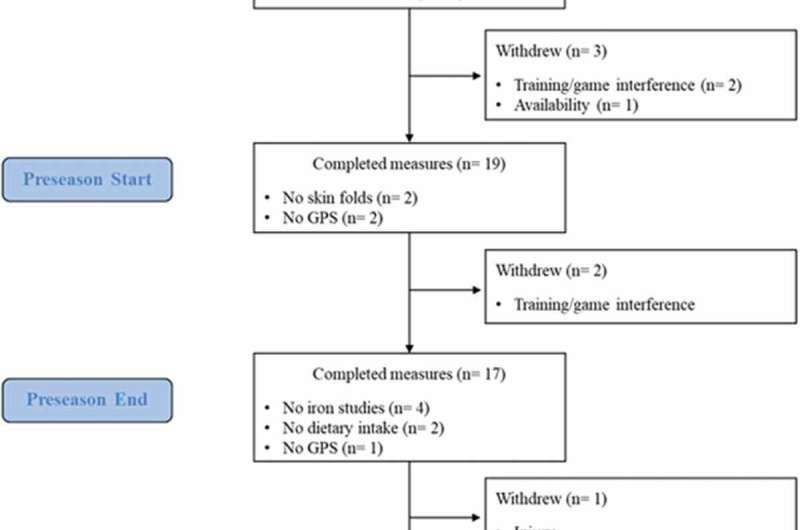This article has been reviewed according to Science X's editorial process and policies. Editors have highlighted the following attributes while ensuring the content's credibility:
fact-checked
trusted source
proofread
Many athletes off mark when it comes to diet

As footy kicks off for state women's leagues, researchers are encouraging teams to take a closer look at athlete nutrition, as new research shows that many elite athletes are not getting enough energy to meet their needs in pre-season training or competition.
Conducted by the University of South Australia in partnership with the Adelaide Football Club, researchers found that most athletes didn't know enough about the nutritional needs of their bodies and that 42% were at risk of low energy availability.
UniSA researcher and practicing dietitian Dr. Alison Hill says most female Australian football players are not getting enough carbohydrates or energy to maintain their performance or health.
"With the emergence of elite female Australian footballers, we need to better understand the impact of diet on women's health and performance," Dr. Hill says
"Aussie rules football requires high aerobic endurance to cover long distances throughout a game and anaerobic power to accommodate frequent bursts of high intensity efforts."
"Diet is a key driver of athletic performance. But AFLW players are not consuming enough energy to perform at their peak."
"Throughout this study, less than 30% of athletes met the recommended minimum energy targets with even fewer meeting carbohydrate targets, both of which could have health implications over the longer term."
Assessing changes in dietary intake, training load and health parameters, the study found that athletes' average daily energy and carbohydrate intakes were lower than recommended across all training and competition seasons.
Dietary data were collected using 3-day weighed food records on non-consecutive days over a week, including two weekday trainings and one non-training weekend day. Players' average carbohydrate intake was highest at start of preseason (3.6 g/kg/day), decreasing during preseason (to 3.1 g/day) and remained low during competition (3.2 g/day).
"By establishing whether elite athletes are meeting their dietary requirements or not, we can work with them to optimize their energy intake and health."
Dr. Hill says that health practitioners working with AFLW athletes should regularly monitor their diets throughout training and competition seasons.
"To perform at an elite level, athletes must fuel their bodies to match their energy output," Dr. Hill says.
"Athletes should seek nutrition and diet planning advice from sports dietitians so they can meet their energy and carbohydrate needs for optimal performance and health."
"Importantly, sports dietitians must identify suboptimal dietary intakes and associated physiological impacts so that they can be addressed as quickly as possible. They should also educate athletes about their nutritional needs and ensure players have easy access to professional supports and information."
The work is published in the journal Science and Medicine in Football.
More information: Chloe J. Otte et al, Seasonal health tracking of Australian Football League Women's athletes, Science and Medicine in Football (2023). DOI: 10.1080/24733938.2023.2175901





















